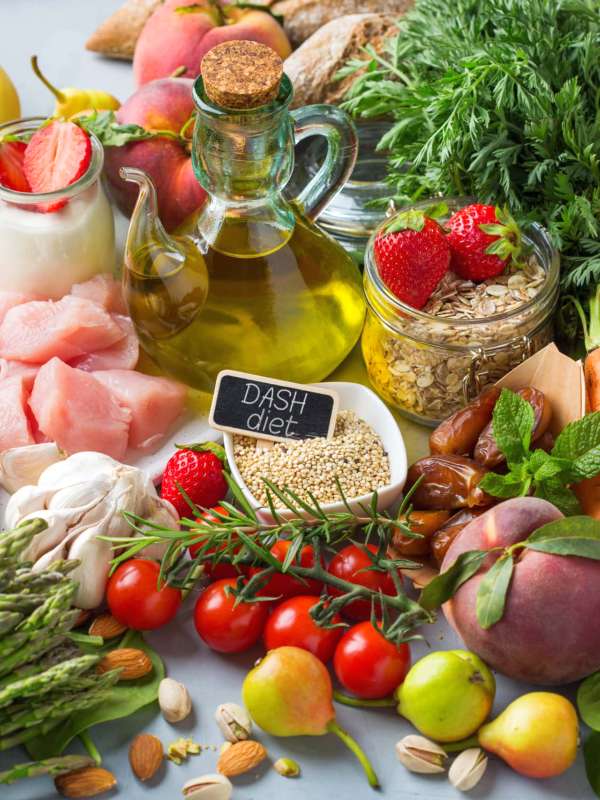Whether you’ve been diagnosed with hypertension, are looking for preventative measures to maintain healthy blood pressure, or are aiming to improve your overall health, the DASH diet might be just what you’re looking for.
Let’s start by explaining both what it is, what it can do, as well as how it differs from other diets in terms of its flexibility.
What is the DASH diet?
DASH stands for ‘Dietary Approaches to Stop Hypertension’. It’s a flexible, balanced eating plan designed to reduce or prevent high blood pressure by supporting your body from the inside out. Developed in the US and backed by research from the National Institutes of Health, the DASH diet has shown impressive results in improving cardiovascular health and overall wellness.
The holistic health benefits of DASH
While its primary focus is blood pressure management, the DASH diet’s benefits extend far beyond that, helping you to:
- Reduce the risk of heart disease, stroke, and some types of cancer
- Improve kidney function and reduce the risk of kidney stones
- Manage diabetes and lower the risk of developing type 2 diabetes
- Enhance bone health due to its emphasis on calcium-rich foods
- Improve mood and cognitive function
- Increase energy levels and overall vitality.
You’ll notice that weight loss isn’t specifically mentioned as a benefit of the DASH diet. That is because DASH isn’t specifically designed for weight loss, and focuses more on cardiovascular health and reducing the risk of hypertension. However, the DASH diet can be used as a weight loss tool if a lower calorie version is followed.
What can you eat on the DASH diet?
The DASH diet encourages eating foods rich in specific nutrients while limiting others.
Followers should focus on eating:
- Potassium
- Calcium
- Magnesium
- Fibre
- Protein
Followers should try to limit eating:
- Sodium
- Saturated fat
- Cholesterol
- Added sugar
The key food groups in the DASH diet include:
- Fruits and vegetables
- Whole grains
- Lean meats, fish, and poultry
- Low-fat dairy products
- Beans, legumes, and pulses
- Nuts and seeds (in moderation)
Practical tips to implement the DASH diet:
To help you get started, here are some easy ways to gently nudge your food choices towards healthier habits for both your heart and blood pressure:
- Gradually increase your intake of fruits and vegetables.
- Choose whole grain options over refined grains.
- Opt for lean proteins and plant-based protein sources.
- Use herbs and spices to flavour food instead of salt.
- Snack on unsalted nuts, seeds, or fresh fruit instead of processed foods.
- Plan your meals in advance to ensure balanced nutrition throughout the week.
The best way to succeed is to start by making small, sustainable changes to your diet, while setting realistic goals and celebrating small victories along the way.
For meal planning ideas and DASH-friendly recipes, visit the National Heart, Lung, and Blood Institute’s DASH eating plan. You’ll find lots of resources, recipes and information to help you choose your preferred food types. To give you a quick idea, here’s a sample of what your regular DASH diet follower will put on their plate.
Sample DASH diet meal plan
- Breakfast: Whole grain toast with avocado and a boiled egg, served with a side of berries
- Lunch: Grilled chicken salad with mixed greens, cherry tomatoes, cucumber, and a light vinaigrette
- Dinner: Baked salmon with quinoa and roasted vegetables
- Snacks: Greek yoghurt with fresh fruit, or carrot sticks with hummus.
Who can benefit from the DASH diet?
The DASH diet can be beneficial for various groups of people, from meal plan first-timers to super-active athletes – and everyone in between. Here’s how:
Middle-aged adults at risk of hypertension
The DASH diet can help prevent the onset of high blood pressure, potentially reducing the need for medication later in life.
Individuals with a family history of heart disease
By following the DASH diet, those with a family history of heart disease may lower their risk of developing the condition, effectively getting ahead of their genetic predisposition.
Pregnant women looking to manage blood pressure naturally
The DASH diet provides essential nutrients for fetal development while helping to control blood pressure without medication, reducing the risk of gestational hypertension.
Athletes seeking a nutrition plan that supports cardiovascular health
The balanced nature of the DASH diet can enhance endurance and recovery, supporting overall athletic performance.
Older adults aiming to maintain healthy blood pressure without medication
The DASH diet can help seniors manage their blood pressure naturally, potentially reducing their reliance on medications and their associated side effects.
In fact, anyone looking to improve their overall health and wellness can benefit from it, even people without specific health concerns. The DASH diet promotes better nutrition, increased energy levels, and improved overall wellbeing; things that can enhance anyone’s life.
Overcoming common challenges with DASH
When adopting the DASH diet, you might face some teething problems. To some degree, your resistance and motivation will depend on how you already eat and how open-minded you are to trying new foods.
Here are four common DASH challenges and some of the ways you can tackle them:
- Reducing sodium: Gradually decrease your salt intake to allow your taste buds to adjust
- Increasing vegetable intake: Experiment with different cooking methods and seasonings to find vegetables you enjoy
- Dining out: Look for grilled, steamed, or roasted options and ask for dressings on the side
- Balancing the diet: Use a food diary or app to ensure you’re getting a good mix of nutrients.
Combining DASH with exercise
As every healthcare professional will likely say to you, exercise matters whether you’re following a specific diet or not. For the DASH diet, getting active can be the difference between seeing immediate (and long-term) results and the fate of many diets: making little or no progress.
The World Health Organization recommends at least 150 minutes of moderate-intensity exercise or 75 minutes of vigorous-intensity exercise per week. Activities can include brisk walking, cycling, swimming, or any other form of exercise you enjoy, so long as it gets the heart pumping and you get in the habit.
Monitoring your progress with Aktiia
Following the DASH diet is one thing, but sticking to it over time is another level! By using a blood pressure continuous monitoring system, you won’t be relying on willpower alone. Continual monitoring will let you see both the immediate and long-term impacts of your dietary choices through the app. This data and insights given are a powerful motivator to stay focused and keep to the plan. It’s what we call the Aktiia effect.
The Aktiia wrist-worn device is designed to effortlessly integrate into your daily routine, promoting healthy habits without disruption-even while you sleep. It works continuously to:
- Track your blood pressure trends throughout the day and night
- Identify how specific meals or dietary changes impact your blood pressure
- Gather information that can be shared with your healthcare provider for personalised advice
- Set goals and send notifications to help you stay on track.
Stay motivated and track your progress effortlessly. Sign up for the Aktiia newsletter to receive expert tips and updates on managing blood pressure with diet, exercise, and continuous monitoring.
Now you’re taking the proactive approach to your cardiovascular health. This powerful combination of dietary changes and technology-enabled insights can help you achieve and maintain optimal blood pressure levels, contributing to your overall health and wellbeing.
Before you make a dash for DASH…
Remember, as with any significant dietary change, it’s always wise to talk to your healthcare provider. Especially if you have existing health conditions, are taking medications or have specific concerns about your health.
In any case, many people who choose the DASH diet find it one of the easiest to follow thanks to the range of foods you can still eat. And combining it with the Aktiia blood pressure system, it’s a proven and effective duo in reducing blood pressure and improving your overall wellness.
Disclaimer: The information in this article is intended for educational purposes only and does not replace medical advice. If you suspect hypertension or are worried about your blood pressure, speak to your doctor. They can advise on the best way to effectively manage it.
Sources:
DASH Eating Plan. National Heart, Lung and Blood Institute. https://www.nhlbi.nih.gov/education/dash-eating-plan (Accessed December 2024)
Appel, L. J., et al. (1997). A clinical trial of the effects of dietary patterns on blood pressure. New England Journal of Medicine, 336(16), 1117-1124. https://doi.org/10.1056/NEJM199704173361601
Sacks, F. M., et al. (2001). Effects on blood pressure of reduced dietary sodium and the Dietary Approaches to Stop Hypertension (DASH) diet. New England Journal of Medicine, 344(1), 3-10. https://doi.org/10.1056/NEJM200101043440101
Soltani S., Arablou T., Jayedi A., Salehi-Abargouei A. (2020). Adherence to the dietary approaches to stop hypertension (DASH) diet in relation to all-cause and cause-specific mortality: a systematic review and dose-response meta-analysis of prospective cohort studies. Nutrition Journal. 19 (1), 37. https://doi.org/10.1186/s12937-020-00554-8
The DASH diet. National Kidney Foundation. https://www.kidney.org/kidney-topics/dash-diet (Accessed December 2024)
Campbell, A. P. (2017). DASH Eating Plan: An Eating Pattern for Diabetes Management. Diabetes Spectrum, 30 (2), 76. https://doi.org/10.2337/ds16-0084
Pao-Hwa, L.; Ginty, F.; L. J. Appel et al. (2003). The DASH Diet and Sodium Reduction Improve Markers of Bone Turnover and Calcium Metabolism in Adults. J. Nutr., 133 (10), 3130. https://doi.org/10.1093/jn/133.10.3130
Food for thought: DASH diet slowed cognitive decline. MD edge psychiatry. https://www.mdedge.com/psychiatry/article/76603/alzheimers-cognition/food-thought-dash-diet-slowed-cognitive-decline (Accessed December 2024)
Physical activity. World Health Organization. https://www.who.int/news-room/fact-sheets/detail/physical-activity (Accessed December 2024)
Get the Measure of Motivation: The Aktiia Effect on Your Blood Pressure. Aktiia. https://aktiia.com/uk/measure-motivation-aktiia-effect (Accessed December 2024)



